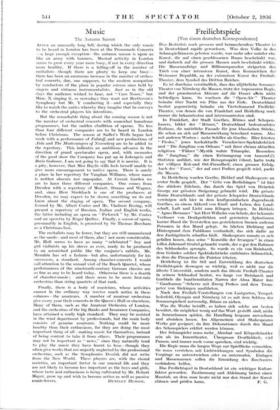Music The Autumn Season AFTER an unusually long lull; during
-which the only music to be heard in London has been at the Promenade Concerts —a large enough exception—the autumn season is upon ,us
like an army with banners. Musical activity in London seems to grow every year more busy, if not in every direction more healthy. If there is a falling-off in the number of recitalists—though there are plenty to keep one busy— there has been an enormous increase in the number of orches- tral concerts, due, one supposes, to the modern usurpation by conductors of the place in popular esteem once held by singers and virtuoso instrumentalists. Just as in the old days the audience wished to hear, not " Caro Nome," but Mine. X singing it, so nowadays they want not Beethoven's • Symphony but Mr. Y conducting it—and especially they like to watch the antics whereby they imagine that he conveys to the orchestral players his intentions.
But the remarkable thing about the coming season is not the number of orchestral concerts with somewhat humdrum programmes, but the sudden ebullition of operas. No less than four different companies are to be heard in London before Christmas. The season at Sadler's Wells began last week with a performance of Falstaff, and new productions of Aida and The Maslersingers of Nuremberg are to be added to the repertory. This indicates an ambitious advance in the direction of grand spectacular opera, and, with memories of the good show the Company has put up in Lohengritt and Boris Godunor, I ant not going to say that it is unwise. It is a pity, however, that Miss Baylis stills feels herself unable to give more encouragement to native opera. There is surely a place in her repertory for Vaughan Williams, whose name is neither obscure nor unpopular. At Covent Garden we are to have three different companies. One comes from Dresden with a repertory of Mozart, Strauss and Wagner, and, since Herr Strohbach is one of the producers at Dresden, we may expect to be shown something we do not know about the staging of opera. The second company, formed by Mr. Albert Coates and Mr. Vladimir Rosing, will present a repertory of Russian, Italian and English works, the latter including an opera on Pickwick " by Mr. Coates and an operetta by Roger Quilter. Finally, a season of opera, presumably in English, is promised by Sir Thomas Beecham as a Christmas-box.
The recitalists may be fewer, but they are still unnumbered as the sands—and most of them, alas ! not more considerable. Mr. Holt seems to have as many " celebrated " boy and girl violinists up his sleeve as ever, ready to be produced to an astonished public like the conjurer's rabbits. Mr. Menuhin has set a fashion—but also, unfortunately for his successors, a standard. Among chamber-concerts I would call attention to the annual visit of the Busch Quartet, whose performances of the nineteenth-century German classics are as fine as any to be heard today. Otherwise there is a dearth of chamber-music ; and there seem to be more first-rate orchestras than string quartets of that rank.
Finally, there is a body of musicians, whose activities cannot in the ordinary way receive much notice in these columns—the amateurs. A number of amateur orchestra's give every year their concerts in the Queen's Hall or elsewhere. Many of them, such as the Amateur Orchestra of London, and the orchestras of the big Banks and Insurance Companies, have attained a really high standard. They may be assisted in the wind department by professionals, but the main body consists of genuine amateurs. Nothing could be more healthy than their enthusiasm, for they are doing the most important thing of all—making music for themselves, instead of being content to take it from others. Their programmes may not be important as " news," since they naturally tend to play the music they have learnt to love—though they often give works that are unjustly neglected by the professional orchestras, such as the Symphonies DvoMk did not write from the New World. These players are, with the choral societies, an important factor in our musical life and they are not likely to become less important as the boys and girls, whose taste and enthusiasm is being cultivated by Mr. Robert Mayer, grow up and wish to become active as well as passive










































 Previous page
Previous page